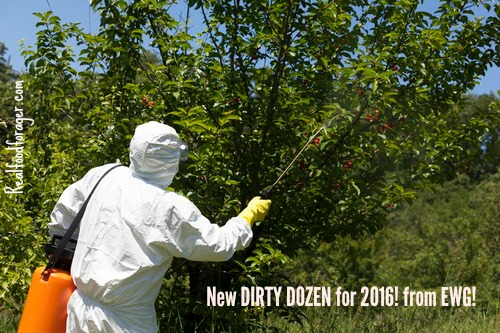
For the first time in 5 years, apples have been ousted from the most contaminated position on the Dirty Dozen from Environmental Working Group (EWG)!
Apples have many different pesticides applied to them if they are not grown organically. Find out which fruit is actually worse than apples this year.
Did you pick the correct one? It’s strawberries. According to the EWG, the worst part of growing conventional strawberries is the fact that before the seeds are planted, the fields are sprayed with what is essentially nerve gas, in order to wipe out every single potential pest to the plant.
Strawberries are Number 1 on the Dirty Dozen List
According to the EWG,
… some [nerve gases are] developed for chemical warfare but now banned by the Geneva Conventions. (source)
Is it that really necessary to use chemical warfare to grow strawberries?
Of course not! For just a little bit more money, organic growers have been successfully raising strawberries for years.
Additionally, according to a new EWG analysis, testing by scientists at the U.S. Department of Agriculture in 2009 and 2014 revealed an average of 5.75 different pesticides per sample, compared to 1.74 pesticides per sample for all other produce.
USDA tests found that strawberries are the fresh produce items most likely to be contaminated with pesticide residues, even after they are picked, rinsed in the field and washed before eating. (source)
Fumigants the Most Dangerous
An older strawberry fumigant is methyl bromide that was banned by an international treaty in 1987 because it destroys the earth’s protective ozone layer. However, its use has continued for almost 40 years, with “critical use exemptions” from the EPA, which will end this year.
Twenty years ago, EWG and other groups campaigned against methyl bromide in California’s Central Coast region – the area where strawberries are mainly grown. The campaign forced the state to establish protective buffer zones near the growing urban areas around the farms, such as, schools and neighborhoods and to restrict methyl bromide injection during school hours. These rules helped to reduced Californians’ exposure to methyl bromide but still allowed its use.
Now, twenty years later, methyl bromide use on strawberries is in decline. However, the new soil fumigants that are replacing it are also hazardous. These are, chloropicrin, the active ingredient in tear gas, and 1,3-dichloropropene, a carcinogen sold by Dow Chemical Company as Telone. Not surprisingly, both are banned in the European Union.
Fumigation by these toxic gases is performed by people in hazmat suits, covering the newly sprayed fields to keep the gas underground and away from people and animals. But these fumigant gases can leak during application and tarps can tear. The leaking fumes endanger farm workers and people who live nearby.
Would you like to live next door to a strawberry farm? I certainly wouldn’t.
Environmental Working Group (EWG) Works for You!
The EWG is a non profit foundation that is primarily funded through individual donations and grants. You can see where they get their dollars from here. This allows them to research and in turn, help fund projects with other non-profit groups that are concerned about our toxic environment, such as, Organic Voices Action Fund (OVAF). This project seeks to emphasize the benefits of eating organic food and works towards the labeling of genetically modified foods.
I really love this organization. They offer the consumer several very helpful guides for a tiny donation which, in turn, helps support their work.
Check out the Dirty Dozen and the Clean Fifteen (these are free) to help you make good choices when shopping for food. I use these lists all the time because I cannot always source organic produce. There are also some types of produce that do not really require you to buy organic. For instance, I usually buy conventional avocados, asparagus, cantaloupe and mangoes.
On the other hand, I always buy organic apples, strawberries, raspberries, grapes and peaches. I am grateful to have these fruit and vegetable selections properly tested each year.
Buying organic supports organic farmers, many of whom are small family farms. Buying organic also is an investment in your health.
What do you do when it comes to produce? Leave a comment and let me know!
Original article and pictures take realfoodforager.com site
Комментариев нет:
Отправить комментарий